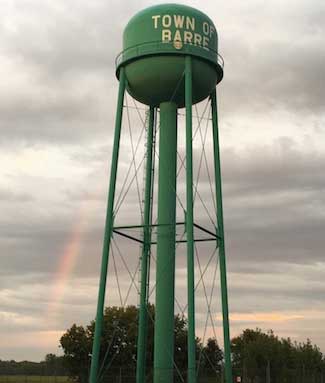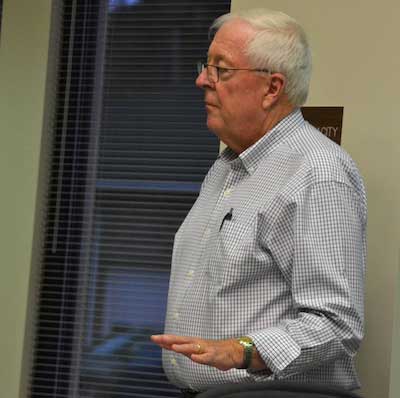County approves $125K study for possible regional water system

Photos by Tom Rivers: Barre has a water tank that serves water users in Barre and Albion.
ALBION – Orleans County and many of the local municipalities will work together with a consultant on a study of the water infrastructure in the county and the possibility of creating a regional water system.
The County Legislature last week approved spending $125,000 for the Wendel firm to complete a water efficiency study. The county expects to receive about $75,000 in state funding for the project, with the county paying $30,000 and other municipalities kicking in $20,000.
“The county wants to maximize the water resources in the county,” Chuck Nesbitt, the county chief administrative officer, told local municipal leaders during a recent meeting about the study.
The study will take an inventory of all the water infrastructure in the county, as well as the personnel devoted to maintaining water lines and running water plants.
The study may show the need for new transmission lines to move water to spots in the county that would be ideal for economic development.
County and municipal officials expect the study will show potential cost savings and efficiencies that will reduce costs and increase capacity. There may be opportunities for sharing services with water meter reading, water billing, and potentially water distribution system repairs.
During meetings with village and town officials, county leaders said this isn’t a precursor to a takeover of the village and town water systems. They would each keep their own infrastructure. One scenario could have a water superintendent overseeing the systems in more than one jurisdiction and a water department focused on fixing leaks and maintaining the system.
Currently each town has a highway superintendent who also functions as the water superintendent. Many of those superintendents are nearing retirement and may not be easy to replace, especially with the licenses needed to serve as water chief.

Gerald Summe, executive vice president of Wendel, met with the Albion Village Board on Oct. 10 and urged the board to participate in the study. The board approved contributing $2,000 to the cost.
“Manpower and skill sets is probably one of the biggest challenges you’re seeing,” Gerald Summe, executive vice president of Wendel, told local officials during a recent meeting.
Creating a regional water system in the county would improve the chances for state and federal funding to maintain and upgrade water treatment plants, and also the transmission lines, Summe told the local officials.
“If you work together you put yourself in a better position to get grants,” he said.
The Village of Albion is currently the main water provider in central Orleans with its water plant in Carlton, using water from Lake Ontario. Albion provides about 1.7 million gallons of water daily for 15,000 customers.
The Village of Lyndonville has a smaller water plant with about 2,200 customers and 400,000 gallons daily. Holley uses water from a well, and is supplemented by the Monroe County Water Authority. The MCWA is the primary supplier in eastern Orleans, with Albion serving a portion of Murray.
The Niagara County Water District is the water supplier for the Village of Medina and most of Shelby and Ridgeway.
The 10 towns have a series of water districts all with varying debt service rates. If the municipalities went to regional system, the debt would stay with each district. There could, however, be more customers to spread out the costs for upgrades to a local water treatment plant and for running new transmission lines to get water where it needs to go.
One scenario could have a single administrator of the water system, while the towns and villages share staff for maintaining the water systems.
Summe said there are significant grants available to help upgrade the water systems in Orleans County. But the first step is doing a study to provide an “economic justification” for the funding.
The Albion Village Board voted to contribute $2,000 to the study. Board members said they would welcome more grants to help upgrade its water plant.
Wendel said it’s likely the state will contribute about $47,500 in a grant through the Local Government Efficiency Program and $25,000 through the New York State Energy and Research Development Authority (NYSERDA).









































































